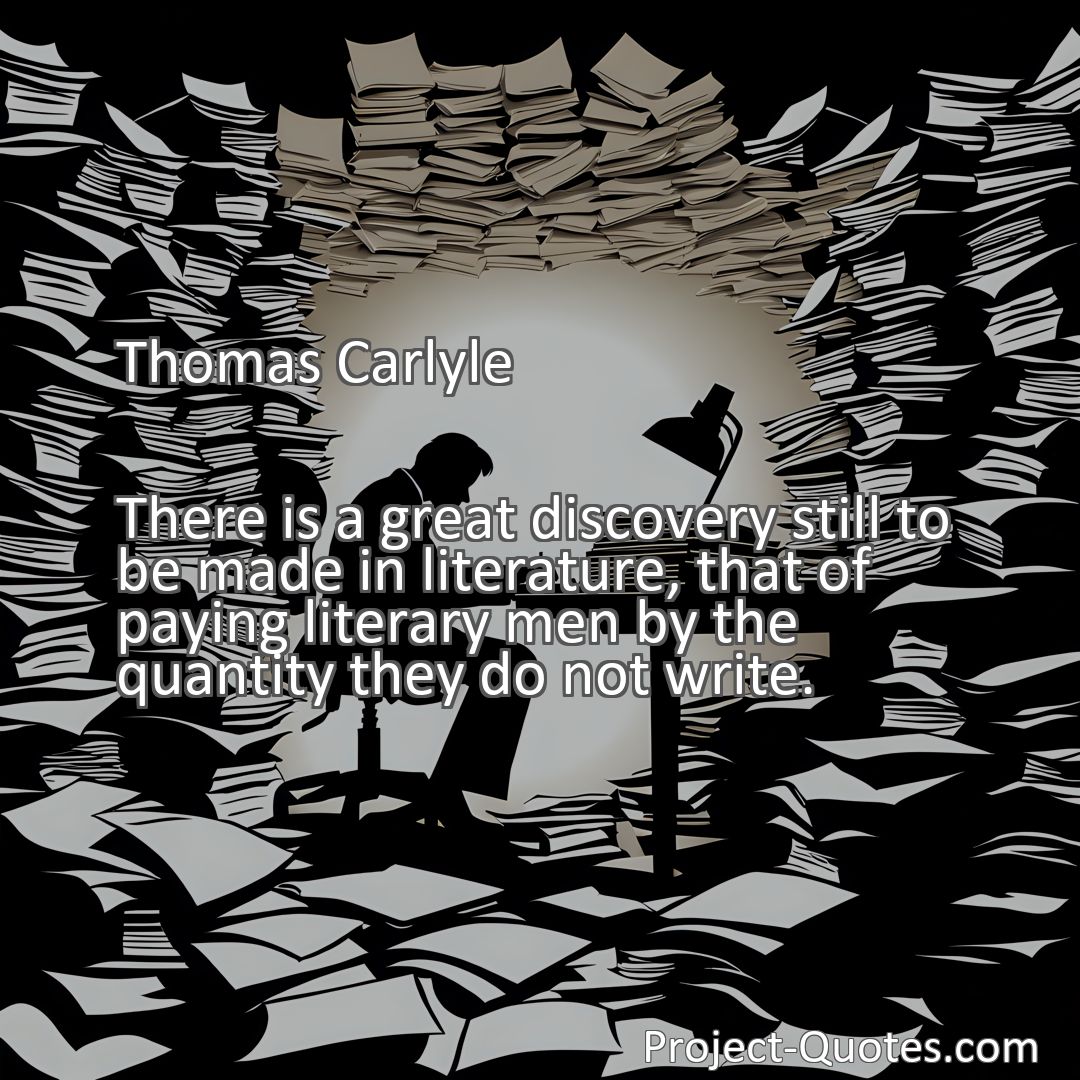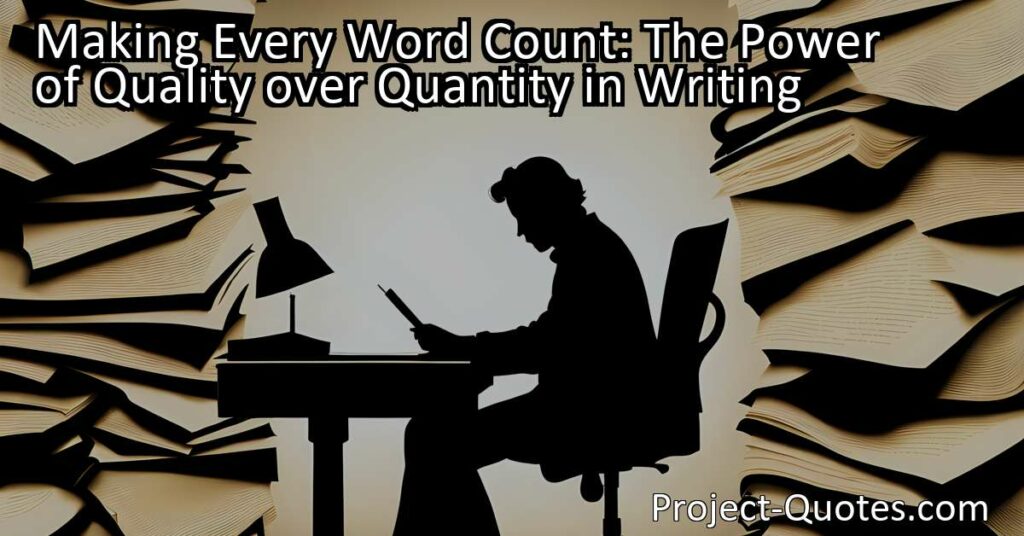There is a great discovery still to be made in literature, that of paying literary men by the quantity they do not write.
Thomas Carlyle
“Making Every Word Count: The Power of Quality over Quantity in Writing” emphasizes the importance of carefully choosing words to create an impactful story. This article suggests that focusing on concise and effective writing can make a story more enjoyable for readers, just like how a simple meal can be more delicious than a complex one. By considering Thomas Carlyle’s idea of paying writers for the words they don’t write, we can improve our own writing and communication skills.
Table of Contents
- 1 There is a great discovery still to be made in literature, that of paying literary men by the quantity they do not write.
- 2 Thomas Carlyle
- 3 Meaning of Quote – There is a great discovery still to be made in literature, that of paying literary men by the quantity they do not write.
- 4 Freely Shareable Quote Image
- 5 Related
Meaning of Quote – There is a great discovery still to be made in literature, that of paying literary men by the quantity they do not write.
Thomas Carlyle, a very smart man from long ago, once said something pretty funny and clever about writers and the books they write. He said, “There is a great discovery still to be made in literature, that of paying literary men by the quantity they do not write.” Can you imagine if writers were given money not for every word they wrote, but for the ones they didn’t? That seems like the opposite of what they’re supposed to do, right? But if you think about it, this idea has a little bit of magic in it, as it’s all about the quality, not the quantity, of what someone writes.
In the world of books and stories, a lot of times people think that the longer a book is, the better it must be. In school, you might even hear your friends bragging about reading really huge books, as if the number of pages alone is what makes the story good. But have you ever read a book that felt like it went on and on without really saying much? It’s like when you’re telling a story to a friend, and instead of getting straight to the interesting part, you keep drifting off into side thoughts and details that don’t matter. After a while, your friend might start staring off into space, or they’ll start fidgeting, hoping you get to the point.
Carlyle thought it would be really neat if writers focused on making every word count, just like when you’re telling a story and want to keep your friends hooked. Imagine you’re building a bridge from the beginning of a story to the end with just your words. Now, if you use too many words, the bridge can get very heavy and hard to cross. But if you pick just the right ones, the bridge is easy to walk across, and everyone can enjoy the journey.
This idea is sort of like a chef creating a perfect dish. You know how sometimes a simple meal with just a few ingredients can taste so much better than something with all kinds of stuff thrown in? That’s because the chef uses only the best ingredients and knows that too many flavors can get confusing. Similarly, a good writer knows that their story should have just enough words to give you all the flavor you need without overwhelming you.
Now, this doesn’t mean that all long books are bad or that short ones are always good. Some stories really do need a lot of words to build their worlds, explain their characters, and wrap you up in their adventures. But Carlyle was reminding us that often, the strength of a story lies in words that are carefully chosen and thoughts that are clearly expressed, not in filling up page after page with extra stuff that isn’t necessary.
Let’s think about all the ways this applies in real life. When you’re doing your homework, for instance, your teacher probably asks you to answer questions with just enough detail to show you understand. If you write three pages when a few sentences would do, you’re not necessarily getting extra credit. Instead, your teacher wants you to demonstrate that you really get what’s being asked and can say it clearly.
In the world of art, isn’t it true that sometimes the simplest images – a few lines, a splash of color – can be the most powerful? It’s the same with writing. A story with too many characters, too many twists, too much description can be overwhelming, like a painting that’s so busy you don’t know where to look.
And then there’s talking with your friends. When you share news or gossip, it’s those to-the-point, “guess what just happened” tidbits that grab everyone’s attention. If you go around the houses, adding in bits that don’t matter, you might lose their interest before you even get to the good part.
So when Carlyle talked about paying writers for the words they don’t write, he was kind of being playful. Nowadays, with so much content everywhere from books to blogs to social media posts his words seem even more meaningful. We live in a time with so much information that sometimes it feels like too much. A well-written story, article, or even a social media post that gets straight to the point can be like a breath of fresh air. It’s refreshing and sometimes more impactful because it’s not buried in a pile of extra, unnecessary words.
In your own life, whether you’re writing an essay for school, a post for social media, or just telling a story to a friend, you can keep Carlyle’s wisdom in mind. Try to say what you mean without adding so much that the main point gets lost. It’s a skill that takes practice, but it makes your writing and your speech much clearer and more engaging for those listening or reading.
In conclusion, while we can’t actually pay writers for the words they decide not to include, we can definitely learn from this fun idea. When writing our own stories or sharing our thoughts, picking the right words not too many or too few can help us communicate better and make our stories more enjoyable for others. So go ahead, the next time you sit down to write or chat, think about Carlyle’s quote, and play around with the magic of using just enough words to make your point shine!
I hope this quote inspired image brings you hope and peace. Share it with someone who needs it today!


